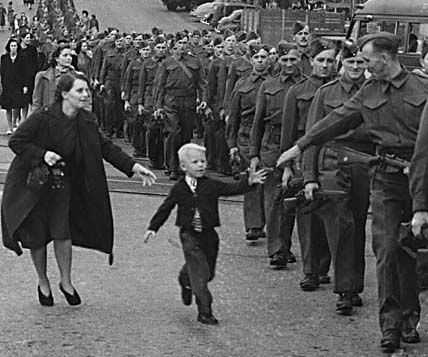The Second World War officially began on 1 September 1939, with the German invasion of Poland. Britain and France declared war on the Nazi Third Reich on 3 September 1939. Seven days later, on 10 September 1939, the Parliament of Canada likewise declared war on Germany, the country's first independent declaration of war[2] and the beginning of Canada's participation in the largest combined national effort in its history. By the war's end, over 1 million citizens would serve in military uniform, and Canada would possess the fourth-largest air force and third-largest naval surface fleet in the world.
Canada's military was active in every theatre of war, though most battles occurred in Italy, Northwestern Europe, and the North Atlantic.
Over the course of the war, 1.1 million Canadians served in the Army, Navy, and Air Force. Of these more than 45,000 lost their lives and another 54,000 were wounded.[6] The financial cost was $21,786,077,519.13, between the 1939 and 1950 fiscal years.[7] By the end of the War, Canada had the world's fourth largest air force,[8] and third largest navy.[9] As well, the Canadian Merchant Navy completed over 25,000 voyages across the Atlantic.[10] Many Allied pilots trained in Canada during the war. Canadians also served in the militaries of various Allied countries.
By D-Day, 6 June 1944, the landings at Normandy were accomplished by two beachheads made by the American forces at Omaha and Utah, two by British forces, Sword and Gold, and a final one at Juno made by the 3rd Canadian Infantry Division.
The war had significant cultural, political and economic effects on Canada, including the conscription crisis which affected unity between Canadian francophones and anglophones. However, the war effort not only strengthened the Canadian economy but further established Canada as a major actor on the world stage.[11]
On 3 September 1939, to control inflation, the federal government established the Wartime Prices and Trade Board.
 Fallen
Fallen


